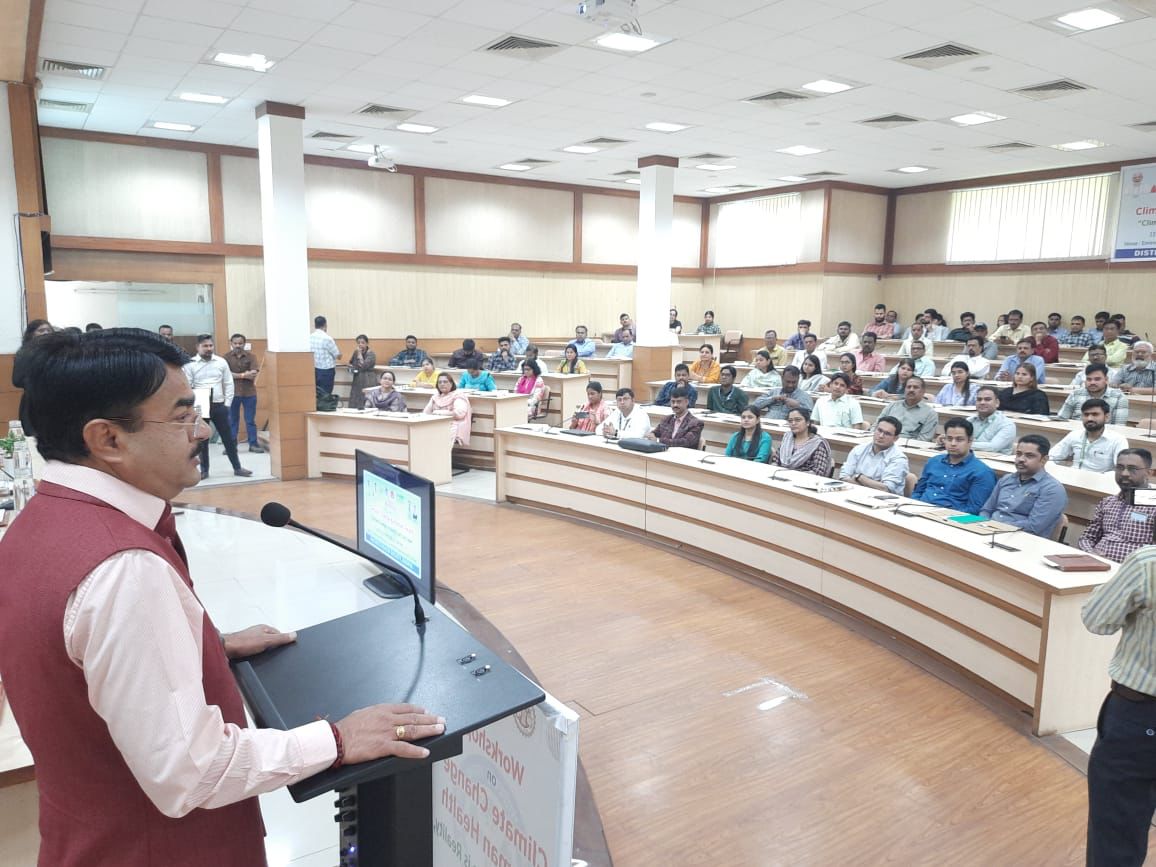CNN Central News & Network–ITDC India Epress/ITDC News Bhopal: An interdepartmental workshop under the National Climate Change and Human Health Program was organized at the Environmental Planning and Coordination Organization (EPCO). Hosted by the Chief Medical and Health Officer’s Office, Bhopal, the workshop saw participation from government and private sector doctors, along with representatives from the Public Health and Medical Education Department, Panchayat Department, AIIMS, Animal Husbandry and Dairy Department, Fisheries and Welfare Department, Indian Institute of Science Education and Research (IISER), UNICEF, Poultry Department, Agriculture and Horticulture, Police Department, Malaria Department, Municipal Corporation, and Jail Department. UNICEF played a special role in supporting the event.
While inaugurating the workshop, Minister of State for Public Health and Medical Education, Narendra Shivaji Patel, emphasized that environmental degradation is the most critical challenge for the future. He stressed the need for immediate action, stating that a clean and safe environment is the greatest gift for future generations. He highlighted the importance of collaboration between government departments and NGOs in mitigating the adverse effects of environmental changes on human health. The Health Department is not only treating diseases caused by environmental imbalance but is also running awareness programs to educate the public.
Addressing the workshop, Bhopal’s Chief Medical and Health Officer, Dr. Prabhakar Tiwari, explained that environmental changes are reducing the nutritional value of fruits, vegetables, and grains while also negatively impacting physical and mental health. He pointed out that air pollution is a leading cause of respiratory diseases, skin and eye infections, and Chronic Obstructive Pulmonary Disease (COPD), which can lead to severe conditions like chronic bronchitis and asthma. He also warned that environmental pollution is increasing non-communicable diseases, making future generations more vulnerable to illnesses. Pregnant women, the elderly, and individuals with chronic illnesses are particularly at risk from environmental hazards.
Lokendra Thakkar, Coordinator of EPCO’s State Knowledge Center, emphasized that environmental imbalances affect weather patterns, plant life, and animal species. He appreciated the Health Department of Bhopal for taking proactive measures in this regard. Over the past few years, the Chief Medical and Health Officer’s Office, Bhopal, has consistently conducted orientation programs and awareness campaigns to raise public sensitivity on the issue.
The workshop also included discussions on the negative effects of climate change on animals, in addition to its impact on human health. Experts from various departments provided valuable insights, including:
Saurabh Saxena (UNICEF)
Dr. Neha Arya (AIIMS)
Meenakshi Sharma (Deputy Director, Animal Husbandry Department)
Sarita Sondhiya & Priyanshi Soni (Fisheries Department)
Ravi Shah (Director, EPCO Institute)
Shantanu Talukdar (Director, IISER)
#ClimateChange #HumanHealth #EnvironmentalImpact #InterdepartmentalWorkshop #ClimateAction #PublicHealth #Sustainability #ClimateAwareness







